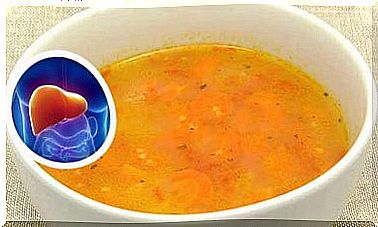The Influence Of The Mediterranean Diet On Gut Health

In recent years , researchers have investigated the effects of the Mediterranean diet on gut health. While they still haven’t explored the link in depth, they have already discovered certain benefits, especially when it comes to the state of the microbiota.
This group of bacteria and microorganisms lives in the digestive system and plays an important role in your health. In fact, they are positively associated with the healthy functioning of the immune system and proper metabolism of food, among other benefits.
What does diet have to do with gut health? Why do we recommend the Mediterranean diet? In this article, we answer these and many other questions about the benefits of this diet.
Diet and intestinal flora
One of the organs most affected by the quality of diet and lifestyle is undoubtedly the gut. Microorganisms that participate in various vital functions such as digestion, the immune system, the inflammatory response or the synthesis of vitamins live in this organ.
So if your gut flora is healthy, balanced and ready to perform these functions, then the characteristics of these functions can be categorized as follows:
- It has the right amount of beneficial microorganisms.
- There is no overgrowth of harmful microorganisms.
- It has sufficient microbial diversity.
With regard to food and the microbiota, we should note that a number of foods enhance the activity of bacteria by exerting anti-inflammatory functions and promoting the production of short-chain fatty acids.
In fact, fatty acids are one of the most important food sources for intestinal cells and they can help to keep the intestinal mucosa in good condition.
In the words of Laura Bolte, principal investigator of a scientific study on diet and gut microbiome: “… the results indicate that diet is likely to become an important and serious line of treatment or management for gut disease, by regulating the gut microbiome .”
Mediterranean diet and gut health

Scientific evidence shows that the Mediterranean diet plays an important role in gut health. In particular, the Mediterranean diet is one of the most studied in terms of nutrition and health.
Broadly speaking, we can say that the Mediterranean diet is associated with a lower risk of chronic diseases, such as cardiovascular disease or diabetes.
Now, a scientific study also associates this eating model with better gut health. Published in the journal Gut, it concludes that following a Mediterranean diet for a year can contribute to:
- Enhancing gut bacteria associated with slowing frailty and cognitive decline.
- Reducing bacteria associated with an inflamed condition.
- Prevents the loss of bacterial diversity.
- Reduces the presence of pro-inflammatory substances that have harmful effects on health.
In this regard, it is important to note that while it is true that the results are positive and open the door for new research, the researchers admitted that the health status of gut bacteria cannot be linked to diet alone.
So when we talk about gut health, we also have to take into account other factors that can also influence the state of health.
What are the characteristics of the Mediterranean diet for gut health?

The nutrients contained in a number of foods in the Mediterranean diet are beneficial to the microbiota, as they have anti-inflammatory effects and act as prebiotics.
While the Mediterranean diet may vary slightly by region, it generally shares some common features. In its traditional form , it is based on the regular intake of certain food groups. It has the following features:
- Extra virgin olive oil is the main source of fat, both for cooking and dressing.
- The daily consumption of vegetables, especially leafy greens.
- Regular consumption of fruits and whole grains.
- Nuts and legumes are included in moderation.
- The consumption of fish (especially oily fish).
- Very moderate consumption of meat and dairy products.
- Little red meat and saturated fat.
According to the evidence, some of these foods are more beneficial in terms of gut health. Which foods are those and why are they important? We’ll look at it in more detail below.
1. Fatty Acids
The optimal absorption of monounsaturated and polyunsaturated fatty acids is important here, accompanied by a low consumption of saturated fats. This lipid profile is beneficial as it is associated with very low anti-inflammatory markers.
2. Microbiota Accessible Carbohydrates (MAC)
Eating this type of fiber is also important, which we can also call MACs. These carbohydrates cannot be digested because the body does not have the enzymes it needs. For this reason, it reaches the large intestine intact, where it is then fermented by bacteria.
From there, a series of good compounds for colon health are obtained, in addition to serving as food for microorganisms. Overall, studies have found higher levels of short-chain fatty acids in the stools of people who regularly ate a Mediterranean diet.
3. Polyphenols
Polyphenols are present in this type of diet as it is abundant in fruits, vegetables, olive oil and aromatic herbs. These compounds are included in the group of prebiotic foods, ie those that nourish gut bacteria. Phenols work positively for two reasons:
- They increase the diversity of gut microbes.
- They help prevent the growth of pathogenic bacteria.
Other healthy habits for the gut flora

Diet is one of the most important factors in determining the composition of your gut flora, but it is not the only one. A number of environmental and lifestyle aspects also affect your condition.
For example, we know that stress negatively affects the gut. In addition, insufficient rest and lack of exercise can have similar effects.
When it comes to food, it’s not just what you eat that affects gut health, but how you do it. It is therefore better to eat slowly and ensure optimal hydration. Finally, to avoid changes in these bacteria, it is best to give up harmful habits such as alcohol and tobacco use.
The Mediterranean diet is also good for gut health
A well-planned Mediterranean diet, with traditional, fresh and unprepared foods, is therefore one of the best in terms of health. In addition to the known benefits at the vascular and cerebral level, we can now add benefits at the gut level as well, as it contains foods and nutrients that are ideal for the microbiota.









